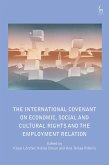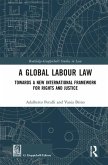Francis Maupain
The Future of the International Labour Organization in the Global Economy
Francis Maupain
The Future of the International Labour Organization in the Global Economy
- Gebundenes Buch
- Merkliste
- Auf die Merkliste
- Bewerten Bewerten
- Teilen
- Produkt teilen
- Produkterinnerung
- Produkterinnerung
As the oldest organization in the UN system, approaching its 100th birthday in 2019, the ILO faces unprecedented strains and challenges. The book forms part of a broader inquiry into the relevance of founding institutional principles to today's context
Andere Kunden interessierten sich auch für
![Decent Work in the Digital Age Decent Work in the Digital Age]() Decent Work in the Digital Age118,99 €
Decent Work in the Digital Age118,99 €![The International Covenant on Economic, Social and Cultural Rights and the Employment Relation The International Covenant on Economic, Social and Cultural Rights and the Employment Relation]() The International Covenant on Economic, Social and Cultural Rights and the Employment Relation199,99 €
The International Covenant on Economic, Social and Cultural Rights and the Employment Relation199,99 €![A Global Labour Law A Global Labour Law]() Adalberto PerulliA Global Labour Law144,99 €
Adalberto PerulliA Global Labour Law144,99 €![Labour Law and the Person Labour Law and the Person]() Lisa Rodgers (University of Leicester)Labour Law and the Person104,99 €
Lisa Rodgers (University of Leicester)Labour Law and the Person104,99 €![Implementing International Disability Law in the European Union Implementing International Disability Law in the European Union]() Ottavio QuiricoImplementing International Disability Law in the European Union144,99 €
Ottavio QuiricoImplementing International Disability Law in the European Union144,99 €![Contract, Labour Law and the Realities of Working Life Contract, Labour Law and the Realities of Working Life]() Eugene Schofield-GeorgesonContract, Labour Law and the Realities of Working Life144,99 €
Eugene Schofield-GeorgesonContract, Labour Law and the Realities of Working Life144,99 €![Your Boss Is an Algorithm Your Boss Is an Algorithm]() Antonio Aloisi (Spain IE University)Your Boss Is an Algorithm33,99 €
Antonio Aloisi (Spain IE University)Your Boss Is an Algorithm33,99 €-
-
-
As the oldest organization in the UN system, approaching its 100th birthday in 2019, the ILO faces unprecedented strains and challenges. The book forms part of a broader inquiry into the relevance of founding institutional principles to today's context
Produktdetails
- Produktdetails
- Verlag: Bloomsbury Publishing PLC
- Seitenzahl: 322
- Erscheinungstermin: 23. Oktober 2013
- Englisch
- Abmessung: 240mm x 161mm x 22mm
- Gewicht: 656g
- ISBN-13: 9781849465021
- ISBN-10: 1849465029
- Artikelnr.: 38060403
- Herstellerkennzeichnung
- Libri GmbH
- Europaallee 1
- 36244 Bad Hersfeld
- gpsr@libri.de
- Verlag: Bloomsbury Publishing PLC
- Seitenzahl: 322
- Erscheinungstermin: 23. Oktober 2013
- Englisch
- Abmessung: 240mm x 161mm x 22mm
- Gewicht: 656g
- ISBN-13: 9781849465021
- ISBN-10: 1849465029
- Artikelnr.: 38060403
- Herstellerkennzeichnung
- Libri GmbH
- Europaallee 1
- 36244 Bad Hersfeld
- gpsr@libri.de
Francis Maupain, who holds a PhD in law from the Sorbonne, an LLM from Harvard Law School and an MPA from Harvard JFK School of Government, spent most of his professional career at the ILO, first as Legal Counsel and more recently as Special Adviser to the Director-General. During this time he has written and lectured extensively on the capacity of the oldest organisation in the UN system to meet the various challenges it faces as a result of changes in the world of labour, the global economy, and the international system.
Introduction: Whither the ILO's Second Century? Persuasion at its Limits in
the Global Economy
I. The (false) dilemma: survival or integrity
II. The real challenge: are 100-year-old institutional choices still valid
in the twenty-first century?
III. The core issue
Part I Ninety Years of Transformations in the International System:
Challenges Posed to ILO Persuasiveness
1. The Cold War and the trente glorieuses, a Not-Quite Golden Age for the
ILO and its Persuasiveness
2. Globalisation Ascendant: The ILO's raison d'être Restored - But the
Gamble on Persuasion Nearly Lost
I. Two decades of recurrent social disappointments and the corresponding
demand for greater social regulation
II. Which puts into question its capacity to meet the demand through the
'traditional' normative strategy
3. Have Recent Efforts at Institutional Renewal Already Fallen Behind the
Pace of Change in the Economic Environment?
I. A renewal in four stages
II. Have the consequences of the financial crisis rendered the renewal old
news?
Part II The Proliferation of Multilateral Actors and the Challenge of
Coherence
4. Social Goals: Doomed to Remain 'Country Cousins' of Economic Objectives
at the Universal Level?
I. From the pre-war marginalisation of the ILO's social objectives to the
Declaration of Philadelphia's failed attempt at a hostile takeover
II. The 'mandated' segregation of social considerations in the (former?)
practice of the World Bank
5. Employment: Functional 'Common Ground' or Policy Fault-line?
I. Employment: free-standing policy objective or economic windfall?
II. The evolving employment dilemma: quantity vs quality
III. The financial crisis: an (as yet) unexploited opportunity to give
social objectives their due
6. Boosting the ILO's Capacity to Promote Coherence
I. Promoting state-level coherence
II. Pursuing coherence through inter-organisational dialogue
III. Actively supporting the emergence of a relevant 'Epistemic Community'
Part III ILO Influence and the Enduring Demand for Universal'Rules of the
Game'
7. From the Impasse of the Social Clause Debate to the Delimitation of
Fundamental Rights at Work as Shared 'Rules of the Game'
I. From the misleading analogy of 'social dumping'
II. Or ambiguous references to 'internationally recognised worker rights'
III. To the ILO's functionalist approach, turning on 'fundamental rights as
enabling rights' (and as potential rules of the game)
8. Can the Social 'Rules of the Game' be Made More Effective by Linking
Them to Basic Trade Rules?
I. Legitimacy, perceptions and barriers to a possible legal transplant
II. Reading between the lines: from a formal marriage of trade rules and
labour rights to a possible (clandestine) liaison?
9. Decentralised Linkages: A Mixed Blessing for the ILO?
I. A mixed blessing from the viewpoint of implementing ILO standards and
procedures
II. A limited 'enforcement' blessing for workers
III. Conclusion: Is there more to the phenomenon than meets the eye?
Part IV The 'Market for Social Justice' to the Rescue of The ILO's
Persuasive Capacities?
10. A Lopsided 'Market for Social Justice' Calling for Public Involvement
I. Consumer preferences to the rescue of failing state resolve
II. Public supply of information to overcome market failure
11. Meeting Transnational Demand with a Transnational Supply: A Jointly
Established Labelling System
I. From the difficulties of 'labelled at destination' to the possibilities
of 'labelled at the origin'
II. Need for a multilateral system of mutual recognition and impartial
verification
III. To guarantee what? Effective application by each party of legislation
satisfying agreed international labour standards
IV. In conclusion: Is there a market for a market-based approach to social
justice?
Conclusion: Reinventing the ILO?
I. Three necessary and feasible aspects of an institutional reinvention
II. Which requires mobilising all actors and drawing on its full array of
transformative powers
III. And widening the horizon of social justice
the Global Economy
I. The (false) dilemma: survival or integrity
II. The real challenge: are 100-year-old institutional choices still valid
in the twenty-first century?
III. The core issue
Part I Ninety Years of Transformations in the International System:
Challenges Posed to ILO Persuasiveness
1. The Cold War and the trente glorieuses, a Not-Quite Golden Age for the
ILO and its Persuasiveness
2. Globalisation Ascendant: The ILO's raison d'être Restored - But the
Gamble on Persuasion Nearly Lost
I. Two decades of recurrent social disappointments and the corresponding
demand for greater social regulation
II. Which puts into question its capacity to meet the demand through the
'traditional' normative strategy
3. Have Recent Efforts at Institutional Renewal Already Fallen Behind the
Pace of Change in the Economic Environment?
I. A renewal in four stages
II. Have the consequences of the financial crisis rendered the renewal old
news?
Part II The Proliferation of Multilateral Actors and the Challenge of
Coherence
4. Social Goals: Doomed to Remain 'Country Cousins' of Economic Objectives
at the Universal Level?
I. From the pre-war marginalisation of the ILO's social objectives to the
Declaration of Philadelphia's failed attempt at a hostile takeover
II. The 'mandated' segregation of social considerations in the (former?)
practice of the World Bank
5. Employment: Functional 'Common Ground' or Policy Fault-line?
I. Employment: free-standing policy objective or economic windfall?
II. The evolving employment dilemma: quantity vs quality
III. The financial crisis: an (as yet) unexploited opportunity to give
social objectives their due
6. Boosting the ILO's Capacity to Promote Coherence
I. Promoting state-level coherence
II. Pursuing coherence through inter-organisational dialogue
III. Actively supporting the emergence of a relevant 'Epistemic Community'
Part III ILO Influence and the Enduring Demand for Universal'Rules of the
Game'
7. From the Impasse of the Social Clause Debate to the Delimitation of
Fundamental Rights at Work as Shared 'Rules of the Game'
I. From the misleading analogy of 'social dumping'
II. Or ambiguous references to 'internationally recognised worker rights'
III. To the ILO's functionalist approach, turning on 'fundamental rights as
enabling rights' (and as potential rules of the game)
8. Can the Social 'Rules of the Game' be Made More Effective by Linking
Them to Basic Trade Rules?
I. Legitimacy, perceptions and barriers to a possible legal transplant
II. Reading between the lines: from a formal marriage of trade rules and
labour rights to a possible (clandestine) liaison?
9. Decentralised Linkages: A Mixed Blessing for the ILO?
I. A mixed blessing from the viewpoint of implementing ILO standards and
procedures
II. A limited 'enforcement' blessing for workers
III. Conclusion: Is there more to the phenomenon than meets the eye?
Part IV The 'Market for Social Justice' to the Rescue of The ILO's
Persuasive Capacities?
10. A Lopsided 'Market for Social Justice' Calling for Public Involvement
I. Consumer preferences to the rescue of failing state resolve
II. Public supply of information to overcome market failure
11. Meeting Transnational Demand with a Transnational Supply: A Jointly
Established Labelling System
I. From the difficulties of 'labelled at destination' to the possibilities
of 'labelled at the origin'
II. Need for a multilateral system of mutual recognition and impartial
verification
III. To guarantee what? Effective application by each party of legislation
satisfying agreed international labour standards
IV. In conclusion: Is there a market for a market-based approach to social
justice?
Conclusion: Reinventing the ILO?
I. Three necessary and feasible aspects of an institutional reinvention
II. Which requires mobilising all actors and drawing on its full array of
transformative powers
III. And widening the horizon of social justice
Introduction: Whither the ILO's Second Century? Persuasion at its Limits in
the Global Economy
I. The (false) dilemma: survival or integrity
II. The real challenge: are 100-year-old institutional choices still valid
in the twenty-first century?
III. The core issue
Part I Ninety Years of Transformations in the International System:
Challenges Posed to ILO Persuasiveness
1. The Cold War and the trente glorieuses, a Not-Quite Golden Age for the
ILO and its Persuasiveness
2. Globalisation Ascendant: The ILO's raison d'être Restored - But the
Gamble on Persuasion Nearly Lost
I. Two decades of recurrent social disappointments and the corresponding
demand for greater social regulation
II. Which puts into question its capacity to meet the demand through the
'traditional' normative strategy
3. Have Recent Efforts at Institutional Renewal Already Fallen Behind the
Pace of Change in the Economic Environment?
I. A renewal in four stages
II. Have the consequences of the financial crisis rendered the renewal old
news?
Part II The Proliferation of Multilateral Actors and the Challenge of
Coherence
4. Social Goals: Doomed to Remain 'Country Cousins' of Economic Objectives
at the Universal Level?
I. From the pre-war marginalisation of the ILO's social objectives to the
Declaration of Philadelphia's failed attempt at a hostile takeover
II. The 'mandated' segregation of social considerations in the (former?)
practice of the World Bank
5. Employment: Functional 'Common Ground' or Policy Fault-line?
I. Employment: free-standing policy objective or economic windfall?
II. The evolving employment dilemma: quantity vs quality
III. The financial crisis: an (as yet) unexploited opportunity to give
social objectives their due
6. Boosting the ILO's Capacity to Promote Coherence
I. Promoting state-level coherence
II. Pursuing coherence through inter-organisational dialogue
III. Actively supporting the emergence of a relevant 'Epistemic Community'
Part III ILO Influence and the Enduring Demand for Universal'Rules of the
Game'
7. From the Impasse of the Social Clause Debate to the Delimitation of
Fundamental Rights at Work as Shared 'Rules of the Game'
I. From the misleading analogy of 'social dumping'
II. Or ambiguous references to 'internationally recognised worker rights'
III. To the ILO's functionalist approach, turning on 'fundamental rights as
enabling rights' (and as potential rules of the game)
8. Can the Social 'Rules of the Game' be Made More Effective by Linking
Them to Basic Trade Rules?
I. Legitimacy, perceptions and barriers to a possible legal transplant
II. Reading between the lines: from a formal marriage of trade rules and
labour rights to a possible (clandestine) liaison?
9. Decentralised Linkages: A Mixed Blessing for the ILO?
I. A mixed blessing from the viewpoint of implementing ILO standards and
procedures
II. A limited 'enforcement' blessing for workers
III. Conclusion: Is there more to the phenomenon than meets the eye?
Part IV The 'Market for Social Justice' to the Rescue of The ILO's
Persuasive Capacities?
10. A Lopsided 'Market for Social Justice' Calling for Public Involvement
I. Consumer preferences to the rescue of failing state resolve
II. Public supply of information to overcome market failure
11. Meeting Transnational Demand with a Transnational Supply: A Jointly
Established Labelling System
I. From the difficulties of 'labelled at destination' to the possibilities
of 'labelled at the origin'
II. Need for a multilateral system of mutual recognition and impartial
verification
III. To guarantee what? Effective application by each party of legislation
satisfying agreed international labour standards
IV. In conclusion: Is there a market for a market-based approach to social
justice?
Conclusion: Reinventing the ILO?
I. Three necessary and feasible aspects of an institutional reinvention
II. Which requires mobilising all actors and drawing on its full array of
transformative powers
III. And widening the horizon of social justice
the Global Economy
I. The (false) dilemma: survival or integrity
II. The real challenge: are 100-year-old institutional choices still valid
in the twenty-first century?
III. The core issue
Part I Ninety Years of Transformations in the International System:
Challenges Posed to ILO Persuasiveness
1. The Cold War and the trente glorieuses, a Not-Quite Golden Age for the
ILO and its Persuasiveness
2. Globalisation Ascendant: The ILO's raison d'être Restored - But the
Gamble on Persuasion Nearly Lost
I. Two decades of recurrent social disappointments and the corresponding
demand for greater social regulation
II. Which puts into question its capacity to meet the demand through the
'traditional' normative strategy
3. Have Recent Efforts at Institutional Renewal Already Fallen Behind the
Pace of Change in the Economic Environment?
I. A renewal in four stages
II. Have the consequences of the financial crisis rendered the renewal old
news?
Part II The Proliferation of Multilateral Actors and the Challenge of
Coherence
4. Social Goals: Doomed to Remain 'Country Cousins' of Economic Objectives
at the Universal Level?
I. From the pre-war marginalisation of the ILO's social objectives to the
Declaration of Philadelphia's failed attempt at a hostile takeover
II. The 'mandated' segregation of social considerations in the (former?)
practice of the World Bank
5. Employment: Functional 'Common Ground' or Policy Fault-line?
I. Employment: free-standing policy objective or economic windfall?
II. The evolving employment dilemma: quantity vs quality
III. The financial crisis: an (as yet) unexploited opportunity to give
social objectives their due
6. Boosting the ILO's Capacity to Promote Coherence
I. Promoting state-level coherence
II. Pursuing coherence through inter-organisational dialogue
III. Actively supporting the emergence of a relevant 'Epistemic Community'
Part III ILO Influence and the Enduring Demand for Universal'Rules of the
Game'
7. From the Impasse of the Social Clause Debate to the Delimitation of
Fundamental Rights at Work as Shared 'Rules of the Game'
I. From the misleading analogy of 'social dumping'
II. Or ambiguous references to 'internationally recognised worker rights'
III. To the ILO's functionalist approach, turning on 'fundamental rights as
enabling rights' (and as potential rules of the game)
8. Can the Social 'Rules of the Game' be Made More Effective by Linking
Them to Basic Trade Rules?
I. Legitimacy, perceptions and barriers to a possible legal transplant
II. Reading between the lines: from a formal marriage of trade rules and
labour rights to a possible (clandestine) liaison?
9. Decentralised Linkages: A Mixed Blessing for the ILO?
I. A mixed blessing from the viewpoint of implementing ILO standards and
procedures
II. A limited 'enforcement' blessing for workers
III. Conclusion: Is there more to the phenomenon than meets the eye?
Part IV The 'Market for Social Justice' to the Rescue of The ILO's
Persuasive Capacities?
10. A Lopsided 'Market for Social Justice' Calling for Public Involvement
I. Consumer preferences to the rescue of failing state resolve
II. Public supply of information to overcome market failure
11. Meeting Transnational Demand with a Transnational Supply: A Jointly
Established Labelling System
I. From the difficulties of 'labelled at destination' to the possibilities
of 'labelled at the origin'
II. Need for a multilateral system of mutual recognition and impartial
verification
III. To guarantee what? Effective application by each party of legislation
satisfying agreed international labour standards
IV. In conclusion: Is there a market for a market-based approach to social
justice?
Conclusion: Reinventing the ILO?
I. Three necessary and feasible aspects of an institutional reinvention
II. Which requires mobilising all actors and drawing on its full array of
transformative powers
III. And widening the horizon of social justice








